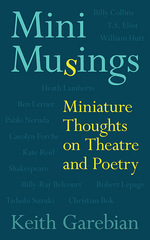
Mini Musings: Miniature Thoughts on Theatre and Poetry
Keith Garebian, 172 pgs, Guernica Editions, guernicaeditions.com, $20
Collections of unfinished thoughts are not always without merit, the good ones playfully begging the reader’s participation. However, the Mini Musings of Keith Garebian, while brief, begs to never have been published at all. Garebian professes fleetingly and promiscuously on many questions of theatre and poetry, seemingly borrowing the organizational idea for the collection from Sarah Ruhl’s 100 Essays I Don’t Have Time to Write.
However, instead of making use of such an open-ended, rhetorical format, Garebian’s book left me with the unpleasant feeling that when it comes to theatre and poetry, this theatre critic has — as do many critics — a decidedly narrow definition of what “greatness” looks like. Garebian’s stodgy range has the additional notable quality of being woefully out of touch with the times (keep reading) and profoundly condescending.
Now, Garebian’s extensive knowledge about theatre is evident in his discussions of the true bawdiness of Shakespeare, his experience with kabuki and his reflections on topics like the transcendent realism of Ibsen. Undoubtedly there is value in this book for someone. For a surface understanding of canonical theatre in Canada, perhaps, this book could be your pocket guide.
However, there is a point when expertise merely decorates narrowmindedness. In the cringeworthy “Great Roles Can Be Cannibalistic,” Garebian elaborately praises his idol Laurence Olivier’s blackface performance of Othello — a choice that angered many at the time and has grown even less palatable in hindsight. Garebian’s description is full of statements where he champions Olivier’s bald use of crude stereotypes of Blackness as somehow proof of his theatrical stature, even referencing Olivier’s “animal stride and sexual confidence” that made him “the very incarnation of Negritude from nappy hair [to] bare chest and feet.”
Not satisfied to leave the grossness at this decidedly high level, Garebian also goes on to praise Olivier’s physical prowess by citing an anecdote wherein he lifts his Othello co-star Dame Maggie Smith with one arm, much to her anger. Smith, along with other former co-stars and ex-wives, has told many stories about Olivier over the years, which depict him as a bully at best. In a 2018 documentary Tea With the Dames, Smith recalled that Olivier once struck her so hard during a performance that she was knocked unconscious. Smith’s anecdote gives a rather different context for Olivier’s physical strength and how he chose to use it.
Not to worry, Garebian does not idolize male actors only (he also valorizes William Hutts and Heath Lamberts). His discriminating nose for theatrical talent applies to playwrights, too. In a long, strange list that is apparently intended to demonstrate Olivier’s vast range of taste, Garebian fails to list a single female, queer, or non-white writer.
It’s impossible to enjoy any shred of wisdom in Garebian’s book when there are so many uncomfortable gaps and gaffs.
